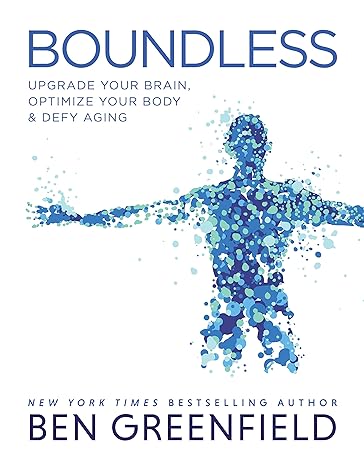
TL;DR
Ben Greenfield’s tome, “Boundless,” is a behemoth in the world of health and wellness literature. Following Greenfield through newsletters and MindValley, it’s clear he’s no slouch in living a life dedicated to wellness. However, as I waded through the tome’s 600+ pages, my initial lukewarm reception cooled further, prompting a revision of my review from two stars down to one.
First off, “Boundless” could use a good diet. It’s hefty. Greenfield seems to revel in the sound of his own keyboard clacking, offering gems like an under-desk cycling machine pitch on page 436, only to conclude that simpler solutions worked best for him. It’s a long-winded way to say very little, a theme that persists throughout the book.
The humor? Let’s just say it misses more than it hits, with attempts at levity feeling more suited to a college dorm than a book that touts itself as a guide to living well.
On the topic of science, “Boundless” takes a casual approach. References to studies are vague, often lacking the detail one might find in academic work. When details are provided, they sometimes mimic the abstracts found on PubMed so closely it makes one wonder about the depth of Greenfield’s research.
The supposed revelations within are often dressed-up common knowledge, accessible with a simple internet search. The advice ranges from the impractical to the nonsensical, like recommending apnea exercises while driving, which seems as unwise as it is unhelpful.
Moreover, Greenfield’s penchant for pseudo-science and a somewhat cavalier attitude towards evidence-based medicine leaves much to be desired. Detox juices that purportedly expel “major toxins” and sound healing that “allows DNA strands to repair themselves” are presented without skepticism, muddying the waters between science and speculation.
Structurally, the book’s information is scattered and repetitive, requiring readers to jump back and forth to piece together coherent advice on any single topic. And while Greenfield mentions studies to back his claims, the lack of detailed references forces readers online for verification, a step that shouldn’t be necessary.
The verdict? If you’re enchanted by Greenfield’s personal brand or enjoy a blend of anecdotal wisdom and light science, “Boundless” might find a place on your coffee table (though its physical quality may not impress). However, those seeking rigorously researched, scientifically grounded advice on health and longevity are advised to look elsewhere. “Boundless” promises a journey to peak wellness but delivers an odyssey into verbosity and vagueness, where the most beneficial exercise might just be lifting the book itself.
Full Review
OVERLY EXTENSIVE
This text needed to be far more succinct. The author indulges in excessive verbosity for seemingly his own enjoyment. For instance, on page 436 he suggests a slew of unnecessary gadgets and ends up recommending his podcast and another book for “even more” insight. This not only adds fluff without substance but also suggests an overwhelming amount of additional reading.
UNWANTED HUMOR
The attempt at humor throughout the book, particularly the juvenile kind, wasn’t to my liking. For example, on page 22, the explanation of the “second brain” in your gut is drawn out with unnecessary banter. A direct statement would have been more efficient and cut down significantly on the page count.
LACK OF DIRECT STUDY REFERENCES
The mention of scientific evidence lacks academic rigor. Statements like “One small study showed that…” are made without detailed references. This contrasts starkly with the content from Dr. Peter Attia, who provides detailed, technical insights. Greenfield’s approach forces readers online for details, which is inconvenient and undermines the integrity of the studies cited.
HYPOTHETICAL STUDIES NOT IDENTIFIED AS SUCH
Many studies cited in the book are speculative, yet Greenfield presents their findings as definitive. For example, he misinterprets speculative research findings as concrete advice, blurring the lines between science and personal conjecture.
MISLEADING TERMINOLOGY
The book occasionally misuses scientific terms. For instance, Greenfield’s broad use of the term “toxins” to include man-made substances, which are more accurately called toxicants, reflects a misunderstanding of scientific language.
UNFOUNDED SCIENTIFIC CLAIMS
Sections of the text veer into pseudoscience, with dubious claims about detox juices and sound healing that lack credible scientific support. These claims are presented without skepticism, despite a lack of evidence from reputable sources.
DISORGANIZED INFORMATION
The presentation of information is disjointed, with topics like gut health scattered throughout the book. This structure makes it difficult to get a comprehensive understanding without flipping back and forth.
FRAGMENTED INFORMATION ON KEY TOPICS
Information on topics such as curcumin is spread out over several pages without coherence. This piecemeal approach complicates understanding and application of the advice given.
QUESTIONABLE ADVICE
Certain recommendations, such as practicing apnea while driving, are not only impractical but potentially dangerous, highlighting a lack of consideration for the reader’s safety and practicality.
“BIOHACKS” ARE COMMONLY KNOWN
Many of the so-called biohacks Greenfield presents are well-known practices readily available through a quick internet search, offering little in the way of novel or insightful information.
RELIANCE ON DEBUNKED THEORIES
Greenfield occasionally embraces concepts that lack scientific foundation, presenting them alongside legitimate science, which can mislead readers unfamiliar with the subject matter.
APPEAL TO PERSONAL APPEARANCE
Greenfield’s youthful appearance is used as a testament to his methods, but at 39, being in good shape is not uncommon and does not necessarily validate his advice.
SUMMARY
In its present form, this book offers a mix of useful insights buried under excessive filler, speculative science, and disorganized presentation. It might have been more valuable as a concise, 200-page guide. Its current sprawling format and reliance on online resources for verification detract from its potential utility.
This book may appeal to those who favor Greenfield’s perspective or prefer a less rigorous approach to science. However, for those seeking solid, science-based advice on health and longevity, it’s advisable to look elsewhere.
References
Related
Review of Outlive by Peter Attia.

